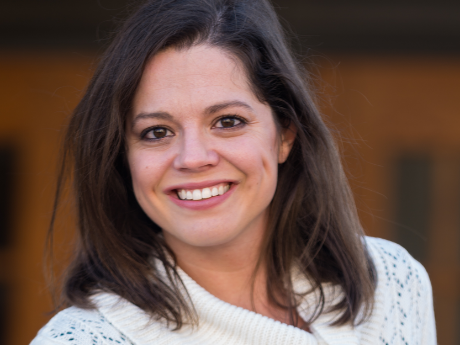Award Winners
Cecil Hemley Memorial Award - 2020
Traci Brimhall
Finalists
Tyler Mills
JinJin Xu

Doctrine of Signatures
Michael from Adams eyes the Filme remov'd
Which that false Fruit that promis'd clearer sight
—Paradise Lost
Because the droop of its fruit resembles lungs,
fistfuls of grapes for breath—the asthma wheeze
now sweet. Because ginseng appears human
and ancient, our aches believe in forever. Because,
for centuries, translating pain proved difficult
and because no other answer announced itself,
great medical minds assumed nature must be a public
and universal manuscript of healing, each hairy root
an analog for the body and its hurts. Because eyebright
blooms into such an obvious signature, the archangel
Michael gave Adam the mirror of his complaint.
My mother sees the tomato’s chambers as a heart
and scoops seeds with her tongue, her cardio myopathy
still, still a weep of ticking. Because walnut wrinkles
seem like they could make me wise, a bowl next to this
year’s unjointed taxes. And I’m beginning to believe
my tinnitus can be cured with a mushroom that curls
and folds like helix, pinna, concha. If what needs curing
is the vengeance in me, I prescribe myself bullhorn acacia.
If what needs curing is the shoebox of anniversary cards
in the closet, then the manchineel and its apple sick
with poisoned milk. And if what needs curing is
my godlessness, the stab of clove in an orange to say
I don’t believe in resurrection, but I do believe in
temptation’s slow smoke and season, its bright illegal
kiss. If what needs healing is memory, my tattoo
shaved off my ribs and gauzed over my eye. If what
heals is alive, let me name it, let me bite it, let what is
hiding in the tree watch me. And then let it sing.
Sally Wen Mao on Traci Brimhall
The best poems are my teachers. I love seeking random facts and delightfully weird phenomena and ephemera as my muses. Poetry can shape a piece of knowledge or history into a sinuous, elastic lyric, so that sometimes we forget we are learning. In “Doctrine of Signatures,” Traci Brimhall weaves a long-outdated system of medical knowledge into the narrative of her poem, unearthing new wonders: “Because ginseng appears human/and ancient, our aches believe in forever…each hairy root/an analog for the body and its hurts.”
I learned from this poem that a doctrine of signatures, dating back to ancient times, is a practice or doctrine where people used the shape and look of plants to divine medicinal properties. It has long been debunked as a pseudoscience. Brimhall writes, “If what needs curing/is the vengeance in me, I prescribe myself bullhorn acacia…if what needs curing is the shoebox of anniversary cards/in the closet, then the manchineel.” Here, the poem acts as both field guide and personal inventory of loss, playing with the mythologies around healing and false medicine. This knowledge feeds the reader's discovery of the speaker’s life—her hurts, her sorrows, her afflictions. In the quest for understanding our own traumas, our own bodies, we have been so wrong, over and over again. Where can we find the value in such failures? Therein lies the tension of this poem—and its role: the capacity for hope, despite all the ways we have failed.
